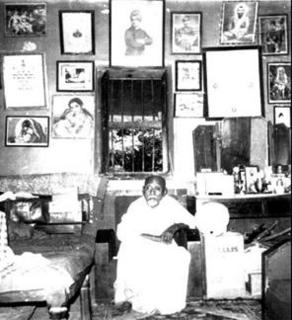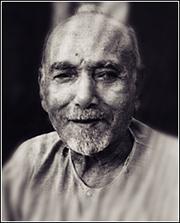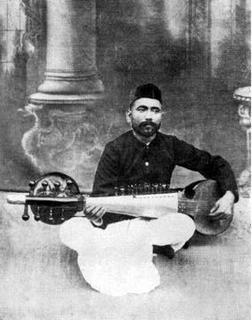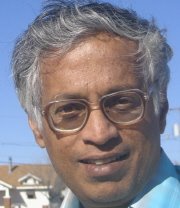Dr. K. Rohiniprasad
 Baba at home
Baba at home
 Seated L to R: Kanthe Maharaj, Kishan Maharaj, Alauddin Khan, Ravi Shankar, Ahmedjan Thirakwa (c.late 1940s)
Seated L to R: Kanthe Maharaj, Kishan Maharaj, Alauddin Khan, Ravi Shankar, Ahmedjan Thirakwa (c.late 1940s)

 Ustad Allauddin Khan in his younger days
Ustad Allauddin Khan in his younger daysA life span of over hundred years is a remarkable achievement in itself but much more so if the list of the centenarian’s disciples reads like a Who’s Who of music. Ustad Allauddin Khan (1862-1972), the saintly and learned man of Maihar in Central India, originally belonged to a wealthy and cultured family in East Bengal. With a strong liking for music, he first learnt to play the violin and tabla from his brother. Unable to cope with schooling, he ran away from home to Calcutta at the age of 8. Vocal lessons from Gopal Chandra Bhattacharya were cut short by the teacher’s sudden demise. The lad then turned to instrumental music, learning about 200 kinds of instruments including violin, clarinet, piano shehnai, drums etc. His teachers were Habul Datta, (brother of Swami Vivekananda), Robert Lobo, (conductor of the Eden Garden Orchestra in Calcutta) and his wife (for western classical music), and Hazari, the shehnai player. Allauddin practised sixteen to twenty hours a day, with his hair tied to a ring in the ceiling so that it would jerk him awake whenever he nodded off!
Initially he performed at theatres, opera and music halls in Calcutta suffering much hardship. He learnt sarod, sursringar, rabab and vocal music from Wazir Khan (a direct descendant of Tansen and the greatest contemporary been player) of Rampur for forty years. He learnt a variety of styles of singing and playing wind, bowed and plucked instruments, and drums. He then became the court musician for the Maharajah of Maihar, organising the Maihar band with 100 orphan children. He taught strings, brass, bagpipes and drums to them and pioneered the orchestration of Indian musical instruments, combining Eastern and Western ideas. He led a very plain and ordinary life, indifferent to material possessions. His early childhood was spent amidst Hindus and so he imbibed the best of both Hinduism and Islam. Other musicians of his time wore colourful costumes, turbans, jewellery and medals but his inner fire outshone their gaudiness.
Mainly a sarod player, his technique incorporated the characteristics of diverse vocal and instrumental playing styles. Initially this invited much criticism. He also played the violin but never performed on the been, sitar and surbahar in deference to his guru’s wishes. For some time the ustad toured the world providing music to Uday Shankar’s dance performances.
While teaching he enlarged the range of possibilities open to an instrumentalist. A strict disciplinarian, Baba, as he was called, groomed several accomplished instrumentalists including his son, Ali Akbar Khan, daughter Annapurna, son-in-law Ravi Shankar, Timir Baran, the Maharajah of Maihar, Pannalal Ghosh, Nikhil Banerjee and others. While Ali Akbar put up with his father’s temper, Ravi Shankar nearly gave up learning at one stage! The ustad’s teaching methods were suited to individual students. Nikhil Banerjee was amazed that his grooming was totally different from that of his illustrious predecessor Ravi Shankar.
Allauddin Khan was mainly responsible for instrument players to enter the concert arena where the vocalists were dominant. He also helped them combine several features of the old gharanas in their presentation. Though he preferred to play established ragas, he invented ragas like Madan Manjri, Subhavati, Dhavalasri, Hemant-Bhairav, Bhuvaneshwari, Hemant, Manj-Khamaj and Hem Bihag etc. He made significant changes in the structure and size of the sarod thus improving its quality and potential. He also created new musical instruments like Chandra-sarang and Nal-tarang.
Honours and recognition came to Baba in the evening of his life: Fellow of the Sangeet Natak Akademi (1952), Padma Bhusan (1958), doctorate from Viswa Bharati and best of all, the reputation of his disciples and their disciples world-wide.






0 Comments:
Post a Comment
<< Home